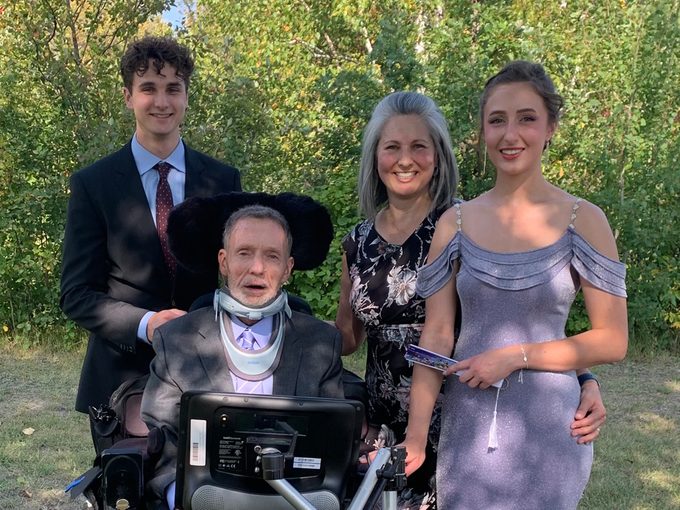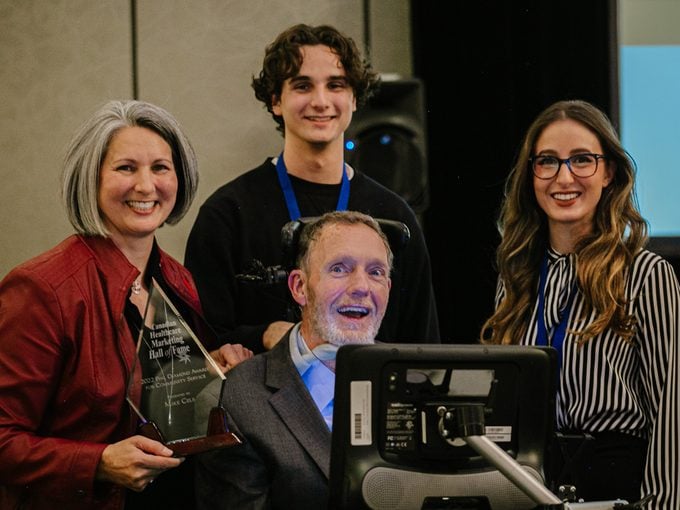Navigating life with ALS: A journey of continuous learning and adapting for patients and their caregivers
“I get up and I show up,” is Mike Cels’s mantra to embracing each day living with the rare, progressive, neurological disease
Being diagnosed with a medical condition can be difficult to cope with, but for those diagnosed with amyotrophic lateral sclerosis (ALS), it is life-altering. Yet, Mike Cels, who was diagnosed with ALS at the age of 53, continues to face each day with an inspiring sense of positivity. With the support of his wife, Carmen, and their two children, Mike takes on each new challenge as a learning opportunity and finds ways to adapt to the realities of living with the disease.
ALS is a rare, neurological disease that attacks the nerve cells that control the muscles of the body, leading to progressive weakness and disability.1 Because early symptoms may mimic those of more common conditions, it takes an average of 21 months to receive an ALS diagnosis in Canada. In most cases, by the time it is discovered, the disease would have already progressed.2 An estimated 4,000 Canadians are living with ALS. Each year, approximately 1,000 Canadians die from ALS, the majority within two to five years of diagnosis.3
When Mike received the news of his diagnosis in 2017, it left him and his family very little time to come to terms with it. “I spent a long time in denial, buried my head in the sand. I didn’t want to accept it. The disease progressed anyway, and I just lost precious time,” Mike explains.

But Carmen sprang into action almost immediately. “I went straight into research mode,” she recalls, “What does this mean? What are we going to have to plan for?”
According to Carmen, Mike’s disease progressed slower than many, starting with losing the ability to walk and talk, and eventually difficulty swallowing and breathing. There were no sudden declines that needed urgent attention.
“This made it a little bit more manageable because we were able to see some of the signs that were coming and we had weeks or even months to get prepared,” Carmen explains.
But one thing the family couldn’t see coming was a global pandemic. When COVID-19 sent the world into lockdown, Mike’s care was severely impacted.
“It became impossible for me to work, or even to work from home and be the primary caregiver, as Mike’s needs were increasing. There was a shortage of nurses, and personal support workers were not offering in-home services,” Carmen says, explaining that this also took a toll on her mental health.
But what made the pandemic even more frightening was when the entire family tested positive. “The vaccines were not out yet, so it was a little scary knowing it was a respiratory illness and I had significant lung function loss,” Mike recalls.
Fortunately, the family recovered and took every precaution to stay safe, such as ensuring support workers coming into their home wore masks and other personal protective wear.
“The pandemic also robbed us of some travel that we wouldn’t be able to do today,” says Carmen.
Now that Mike relies on several types of equipment such as a wheelchair for mobility, travelling is a lot more challenging. “Every step of every day requires planning, appropriate packing of all the different kinds of devices and equipment and supplies that we need,” Carmen explains.
Nevertheless, the Cels are determined to make the most of time and celebrate milestones, no matter how big or small. Despite it being a huge logistical undertaking, Mike was able to travel across Canada to attend a family wedding in Winnipeg and did not miss out on the proud moment of seeing his son graduate last year.
However, some aspects of the disease were more difficult to grapple with.
“One of the most difficult times along this journey has been when Mike’s speech was becoming increasingly difficult to understand. Physical mobility is one thing to have to deal with, but the inability to communicate is completely another level of loss,” says Carmen.
Today, Mike uses eye-gaze technology to communicate, where a camera attached to his communication device follows his eye movement to select and read out pre-programmed text.4
“Since the disease doesn’t stop progressing, we have to learn new approaches and teach them to my support team. This takes time and energy, both things which are in short supply due to ALS,” Mike says.
Despite it all, the family remains positive. “With Mike having lived for more than six years, holistically he’s done very well and it’s a very positive situation in the face of the diagnosis,” Carmen notes.
Knowing that it takes a community to support those affected by ALS, Mike and Carmen are raising awareness about ALS as well as resources and support available to those affected by the disease, through sharing their story.

Over the years, the Cels relied on the ALS Society of Canada for support through Mike’s journey and as a reputable source of information. They have since been active partners with the organization, contributing to the meaningful work it does.
Even before his diagnosis, Mike was an advocate for increased access to treatment for Canadians living with different medical conditions.
In recognition of his advocacy work, he was inducted into the Canadian Healthcare Marketing Hall of Fame. Mike’s active role in the ALS community also earned him the special recognition of the Phil Diamond Award, a proud moment for the Cels family.
“We still participate in as many projects and events as possible and do our best to be there. We can’t always participate due to Mike’s increasingly complex care schedule, but we always discuss if we could and what would it take,” Carmen says.
For persons recently diagnosed with ALS, Mike and Carmen recommend knowing what resources are available, finding a strong support system, and seeking help early.
“Based on my own experience, I would encourage new patients and their families to not wait for anything from renovations to travel to anything else,” Mike encourages.
For more information on how to navigate your ALS diagnosis and living with the condition, please visit www.alspathways.ca, which features interviews and personal stories from those impacted by ALS: patients, caregivers, and healthcare professionals.
[1] ALS Pathways. Canada: ALS Overview; c2023. Accessed on January 17, 2023. What is ALS? Available from: https://www.alspathways.ca/als-overview/
[2] Richards D, Morren JA, Pioro EP. Time to diagnosis and factors affecting diagnostic delay in amyotrophic lateral sclerosis. J Neurol Sci. 2020;417:117054. https://doi.org/10.1016/j.jns.2020.117054.
[3] ALS Canada. Canada. About ALS; c2020. Accessed on January 17, 2024. ALS Figures. Available from: https://als.ca/what-is-als/about-als/
[4] CENMAC. Assistive Technology in Education. United States. Eye Gaze Technology; c2024. Access on January 17, 2024. What is Eye-Gaze? Available from: https://cenmac.com/resources/eye-gaze/




